Analysis of Entrepreneurial Characteristics and Business Report
VerifiedAdded on 2021/02/22
|9
|2709
|55
Report
AI Summary
This report provides an in-depth analysis of entrepreneurship and small business management, focusing on the characteristics, traits, and skills of successful entrepreneurs, using Bill Gates and Henry Ford as case studies. The report examines the importance of entrepreneurial mindset, exploring the Ocean Model of Personality and its relevance to entrepreneurial success. It discusses the impact of background and experience on fostering entrepreneurial abilities, highlighting both positive and negative influences. The report further analyzes the motivational drivers behind entrepreneurial ventures, linking these aspects to personal background and experience. The conclusion summarizes the significance of small and micro businesses in economic growth and emphasizes the key elements of a successful entrepreneurial journey, offering valuable insights into the field of entrepreneurship.
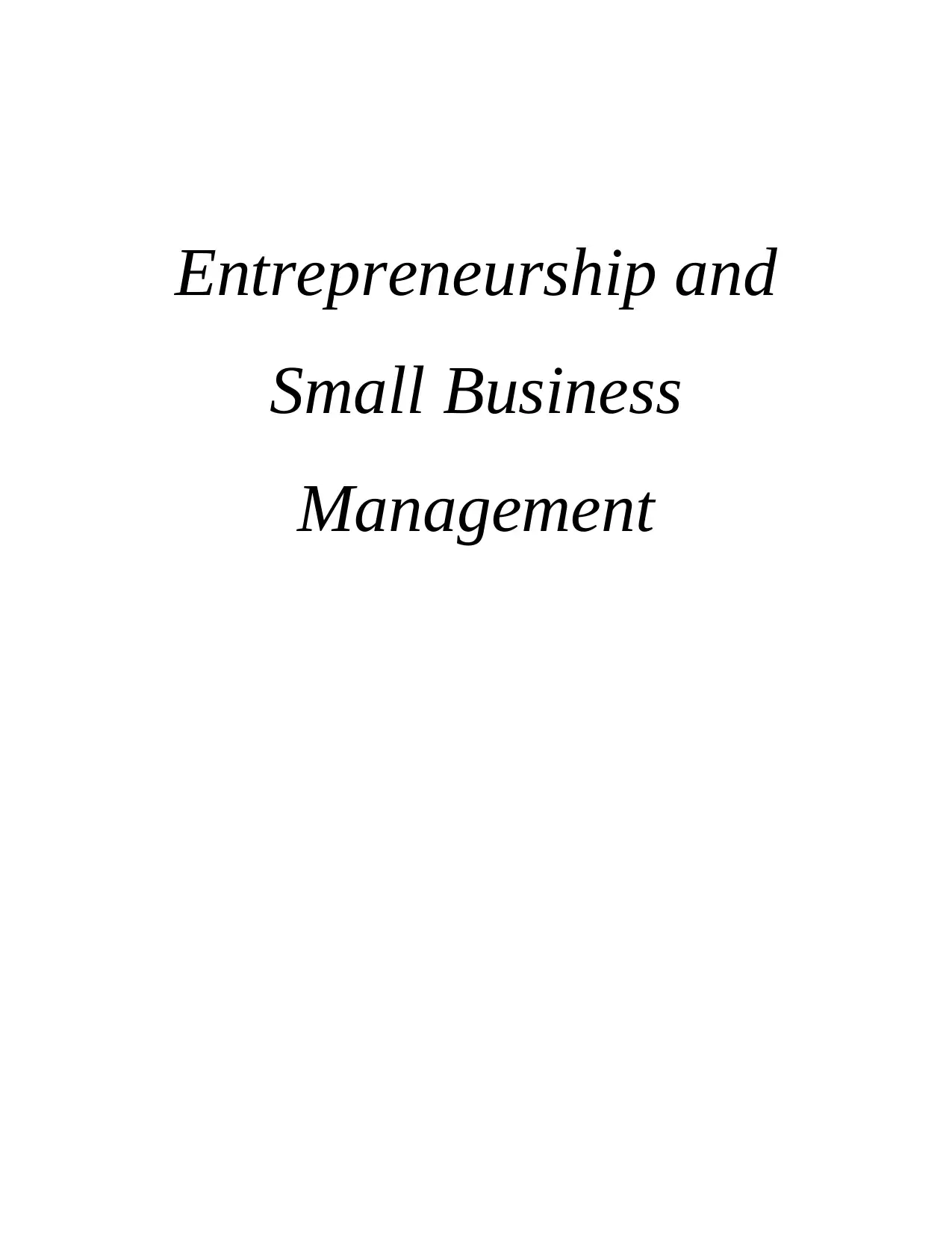
Entrepreneurship and
Small Business
Management
Small Business
Management
Paraphrase This Document
Need a fresh take? Get an instant paraphrase of this document with our AI Paraphraser
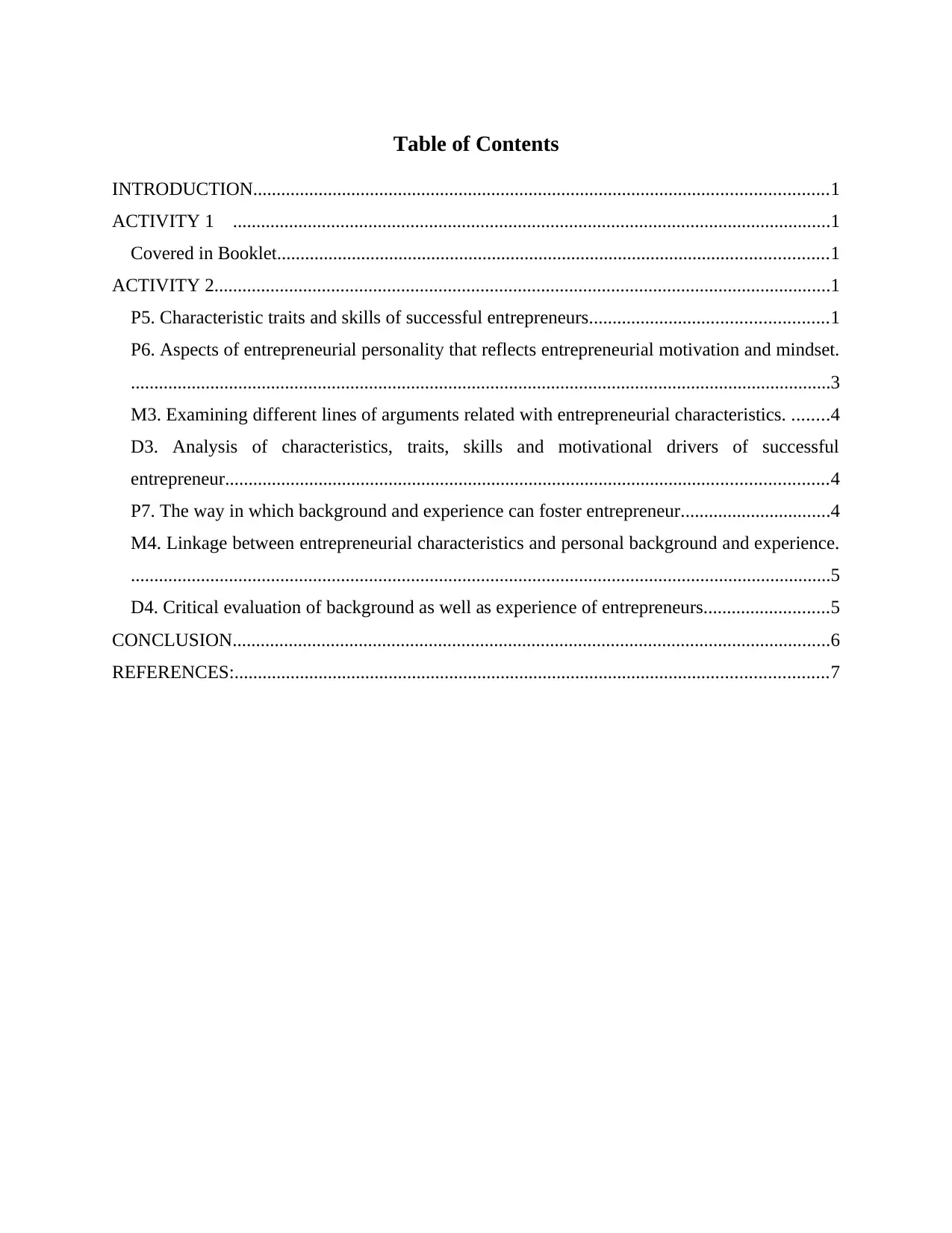
Table of Contents
INTRODUCTION...........................................................................................................................1
ACTIVITY 1 ................................................................................................................................1
Covered in Booklet......................................................................................................................1
ACTIVITY 2....................................................................................................................................1
P5. Characteristic traits and skills of successful entrepreneurs...................................................1
P6. Aspects of entrepreneurial personality that reflects entrepreneurial motivation and mindset.
......................................................................................................................................................3
M3. Examining different lines of arguments related with entrepreneurial characteristics. ........4
D3. Analysis of characteristics, traits, skills and motivational drivers of successful
entrepreneur.................................................................................................................................4
P7. The way in which background and experience can foster entrepreneur................................4
M4. Linkage between entrepreneurial characteristics and personal background and experience.
......................................................................................................................................................5
D4. Critical evaluation of background as well as experience of entrepreneurs...........................5
CONCLUSION................................................................................................................................6
REFERENCES:...............................................................................................................................7
INTRODUCTION...........................................................................................................................1
ACTIVITY 1 ................................................................................................................................1
Covered in Booklet......................................................................................................................1
ACTIVITY 2....................................................................................................................................1
P5. Characteristic traits and skills of successful entrepreneurs...................................................1
P6. Aspects of entrepreneurial personality that reflects entrepreneurial motivation and mindset.
......................................................................................................................................................3
M3. Examining different lines of arguments related with entrepreneurial characteristics. ........4
D3. Analysis of characteristics, traits, skills and motivational drivers of successful
entrepreneur.................................................................................................................................4
P7. The way in which background and experience can foster entrepreneur................................4
M4. Linkage between entrepreneurial characteristics and personal background and experience.
......................................................................................................................................................5
D4. Critical evaluation of background as well as experience of entrepreneurs...........................5
CONCLUSION................................................................................................................................6
REFERENCES:...............................................................................................................................7
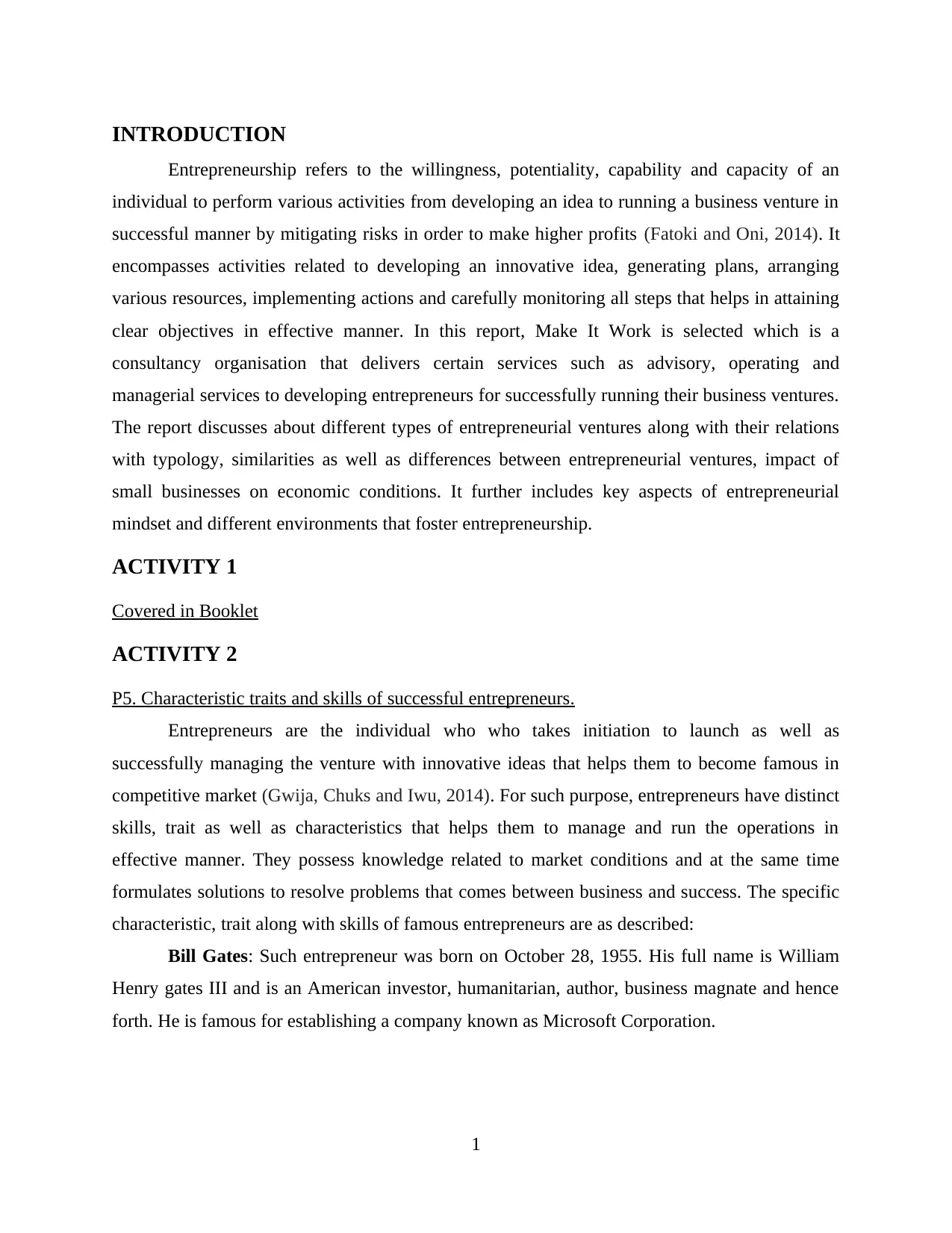
INTRODUCTION
Entrepreneurship refers to the willingness, potentiality, capability and capacity of an
individual to perform various activities from developing an idea to running a business venture in
successful manner by mitigating risks in order to make higher profits (Fatoki and Oni, 2014). It
encompasses activities related to developing an innovative idea, generating plans, arranging
various resources, implementing actions and carefully monitoring all steps that helps in attaining
clear objectives in effective manner. In this report, Make It Work is selected which is a
consultancy organisation that delivers certain services such as advisory, operating and
managerial services to developing entrepreneurs for successfully running their business ventures.
The report discusses about different types of entrepreneurial ventures along with their relations
with typology, similarities as well as differences between entrepreneurial ventures, impact of
small businesses on economic conditions. It further includes key aspects of entrepreneurial
mindset and different environments that foster entrepreneurship.
ACTIVITY 1
Covered in Booklet
ACTIVITY 2
P5. Characteristic traits and skills of successful entrepreneurs.
Entrepreneurs are the individual who who takes initiation to launch as well as
successfully managing the venture with innovative ideas that helps them to become famous in
competitive market (Gwija, Chuks and Iwu, 2014). For such purpose, entrepreneurs have distinct
skills, trait as well as characteristics that helps them to manage and run the operations in
effective manner. They possess knowledge related to market conditions and at the same time
formulates solutions to resolve problems that comes between business and success. The specific
characteristic, trait along with skills of famous entrepreneurs are as described:
Bill Gates: Such entrepreneur was born on October 28, 1955. His full name is William
Henry gates III and is an American investor, humanitarian, author, business magnate and hence
forth. He is famous for establishing a company known as Microsoft Corporation.
1
Entrepreneurship refers to the willingness, potentiality, capability and capacity of an
individual to perform various activities from developing an idea to running a business venture in
successful manner by mitigating risks in order to make higher profits (Fatoki and Oni, 2014). It
encompasses activities related to developing an innovative idea, generating plans, arranging
various resources, implementing actions and carefully monitoring all steps that helps in attaining
clear objectives in effective manner. In this report, Make It Work is selected which is a
consultancy organisation that delivers certain services such as advisory, operating and
managerial services to developing entrepreneurs for successfully running their business ventures.
The report discusses about different types of entrepreneurial ventures along with their relations
with typology, similarities as well as differences between entrepreneurial ventures, impact of
small businesses on economic conditions. It further includes key aspects of entrepreneurial
mindset and different environments that foster entrepreneurship.
ACTIVITY 1
Covered in Booklet
ACTIVITY 2
P5. Characteristic traits and skills of successful entrepreneurs.
Entrepreneurs are the individual who who takes initiation to launch as well as
successfully managing the venture with innovative ideas that helps them to become famous in
competitive market (Gwija, Chuks and Iwu, 2014). For such purpose, entrepreneurs have distinct
skills, trait as well as characteristics that helps them to manage and run the operations in
effective manner. They possess knowledge related to market conditions and at the same time
formulates solutions to resolve problems that comes between business and success. The specific
characteristic, trait along with skills of famous entrepreneurs are as described:
Bill Gates: Such entrepreneur was born on October 28, 1955. His full name is William
Henry gates III and is an American investor, humanitarian, author, business magnate and hence
forth. He is famous for establishing a company known as Microsoft Corporation.
1
⊘ This is a preview!⊘
Do you want full access?
Subscribe today to unlock all pages.

Trusted by 1+ million students worldwide
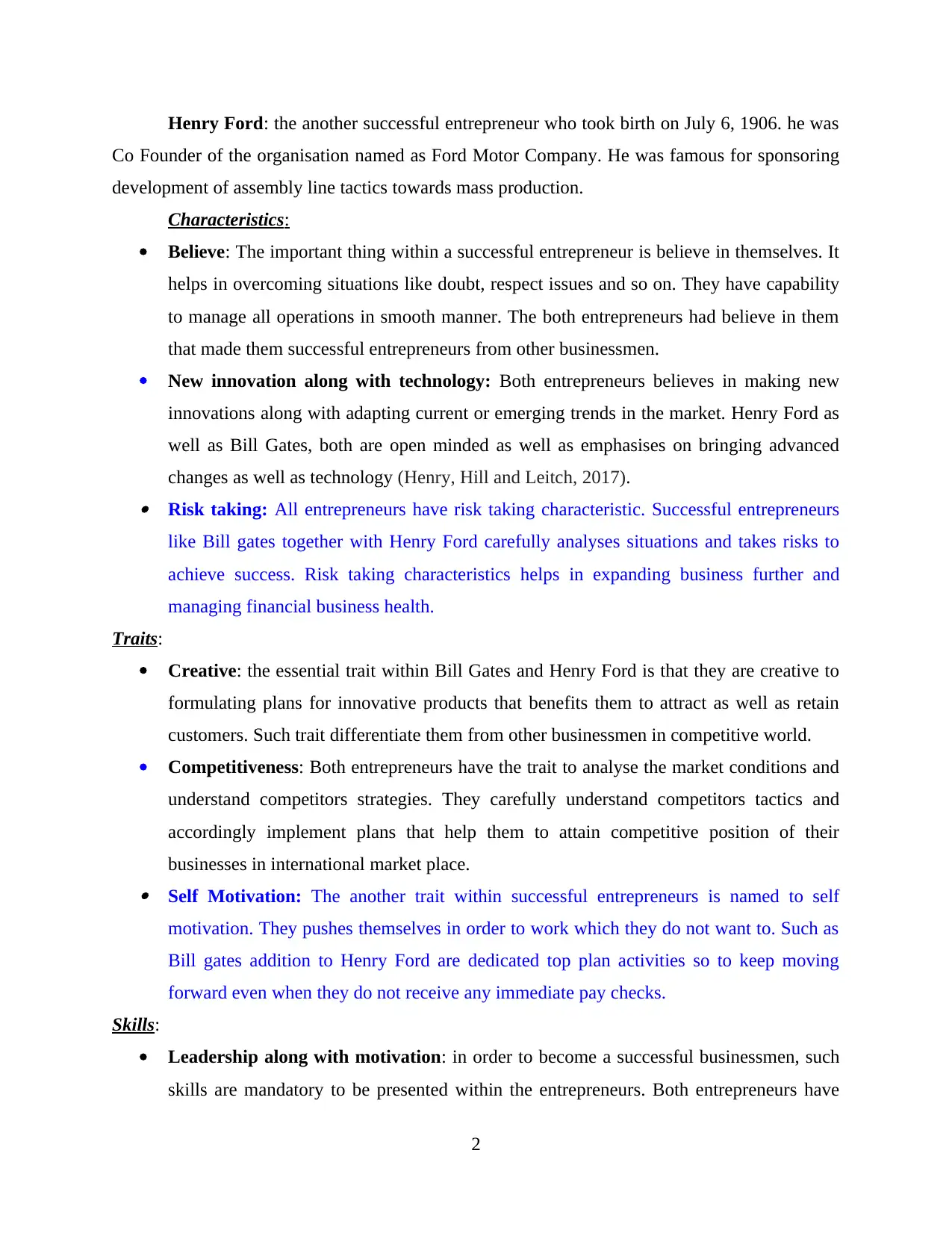
Henry Ford: the another successful entrepreneur who took birth on July 6, 1906. he was
Co Founder of the organisation named as Ford Motor Company. He was famous for sponsoring
development of assembly line tactics towards mass production.
Characteristics:
Believe: The important thing within a successful entrepreneur is believe in themselves. It
helps in overcoming situations like doubt, respect issues and so on. They have capability
to manage all operations in smooth manner. The both entrepreneurs had believe in them
that made them successful entrepreneurs from other businessmen.
New innovation along with technology: Both entrepreneurs believes in making new
innovations along with adapting current or emerging trends in the market. Henry Ford as
well as Bill Gates, both are open minded as well as emphasises on bringing advanced
changes as well as technology (Henry, Hill and Leitch, 2017). Risk taking: All entrepreneurs have risk taking characteristic. Successful entrepreneurs
like Bill gates together with Henry Ford carefully analyses situations and takes risks to
achieve success. Risk taking characteristics helps in expanding business further and
managing financial business health.
Traits:
Creative: the essential trait within Bill Gates and Henry Ford is that they are creative to
formulating plans for innovative products that benefits them to attract as well as retain
customers. Such trait differentiate them from other businessmen in competitive world.
Competitiveness: Both entrepreneurs have the trait to analyse the market conditions and
understand competitors strategies. They carefully understand competitors tactics and
accordingly implement plans that help them to attain competitive position of their
businesses in international market place. Self Motivation: The another trait within successful entrepreneurs is named to self
motivation. They pushes themselves in order to work which they do not want to. Such as
Bill gates addition to Henry Ford are dedicated top plan activities so to keep moving
forward even when they do not receive any immediate pay checks.
Skills:
Leadership along with motivation: in order to become a successful businessmen, such
skills are mandatory to be presented within the entrepreneurs. Both entrepreneurs have
2
Co Founder of the organisation named as Ford Motor Company. He was famous for sponsoring
development of assembly line tactics towards mass production.
Characteristics:
Believe: The important thing within a successful entrepreneur is believe in themselves. It
helps in overcoming situations like doubt, respect issues and so on. They have capability
to manage all operations in smooth manner. The both entrepreneurs had believe in them
that made them successful entrepreneurs from other businessmen.
New innovation along with technology: Both entrepreneurs believes in making new
innovations along with adapting current or emerging trends in the market. Henry Ford as
well as Bill Gates, both are open minded as well as emphasises on bringing advanced
changes as well as technology (Henry, Hill and Leitch, 2017). Risk taking: All entrepreneurs have risk taking characteristic. Successful entrepreneurs
like Bill gates together with Henry Ford carefully analyses situations and takes risks to
achieve success. Risk taking characteristics helps in expanding business further and
managing financial business health.
Traits:
Creative: the essential trait within Bill Gates and Henry Ford is that they are creative to
formulating plans for innovative products that benefits them to attract as well as retain
customers. Such trait differentiate them from other businessmen in competitive world.
Competitiveness: Both entrepreneurs have the trait to analyse the market conditions and
understand competitors strategies. They carefully understand competitors tactics and
accordingly implement plans that help them to attain competitive position of their
businesses in international market place. Self Motivation: The another trait within successful entrepreneurs is named to self
motivation. They pushes themselves in order to work which they do not want to. Such as
Bill gates addition to Henry Ford are dedicated top plan activities so to keep moving
forward even when they do not receive any immediate pay checks.
Skills:
Leadership along with motivation: in order to become a successful businessmen, such
skills are mandatory to be presented within the entrepreneurs. Both entrepreneurs have
2
Paraphrase This Document
Need a fresh take? Get an instant paraphrase of this document with our AI Paraphraser
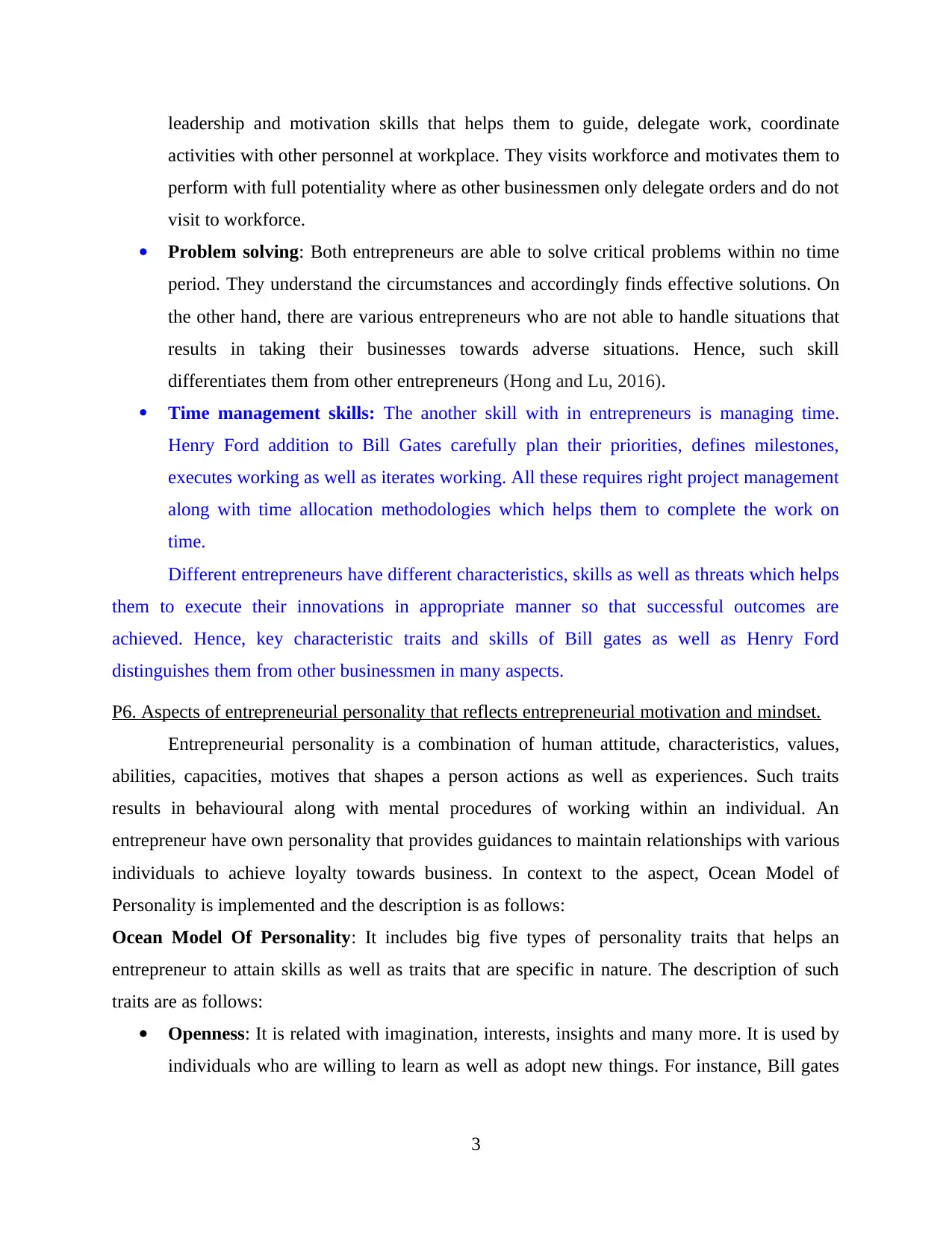
leadership and motivation skills that helps them to guide, delegate work, coordinate
activities with other personnel at workplace. They visits workforce and motivates them to
perform with full potentiality where as other businessmen only delegate orders and do not
visit to workforce.
Problem solving: Both entrepreneurs are able to solve critical problems within no time
period. They understand the circumstances and accordingly finds effective solutions. On
the other hand, there are various entrepreneurs who are not able to handle situations that
results in taking their businesses towards adverse situations. Hence, such skill
differentiates them from other entrepreneurs (Hong and Lu, 2016).
Time management skills: The another skill with in entrepreneurs is managing time.
Henry Ford addition to Bill Gates carefully plan their priorities, defines milestones,
executes working as well as iterates working. All these requires right project management
along with time allocation methodologies which helps them to complete the work on
time.
Different entrepreneurs have different characteristics, skills as well as threats which helps
them to execute their innovations in appropriate manner so that successful outcomes are
achieved. Hence, key characteristic traits and skills of Bill gates as well as Henry Ford
distinguishes them from other businessmen in many aspects.
P6. Aspects of entrepreneurial personality that reflects entrepreneurial motivation and mindset.
Entrepreneurial personality is a combination of human attitude, characteristics, values,
abilities, capacities, motives that shapes a person actions as well as experiences. Such traits
results in behavioural along with mental procedures of working within an individual. An
entrepreneur have own personality that provides guidances to maintain relationships with various
individuals to achieve loyalty towards business. In context to the aspect, Ocean Model of
Personality is implemented and the description is as follows:
Ocean Model Of Personality: It includes big five types of personality traits that helps an
entrepreneur to attain skills as well as traits that are specific in nature. The description of such
traits are as follows:
Openness: It is related with imagination, interests, insights and many more. It is used by
individuals who are willing to learn as well as adopt new things. For instance, Bill gates
3
activities with other personnel at workplace. They visits workforce and motivates them to
perform with full potentiality where as other businessmen only delegate orders and do not
visit to workforce.
Problem solving: Both entrepreneurs are able to solve critical problems within no time
period. They understand the circumstances and accordingly finds effective solutions. On
the other hand, there are various entrepreneurs who are not able to handle situations that
results in taking their businesses towards adverse situations. Hence, such skill
differentiates them from other entrepreneurs (Hong and Lu, 2016).
Time management skills: The another skill with in entrepreneurs is managing time.
Henry Ford addition to Bill Gates carefully plan their priorities, defines milestones,
executes working as well as iterates working. All these requires right project management
along with time allocation methodologies which helps them to complete the work on
time.
Different entrepreneurs have different characteristics, skills as well as threats which helps
them to execute their innovations in appropriate manner so that successful outcomes are
achieved. Hence, key characteristic traits and skills of Bill gates as well as Henry Ford
distinguishes them from other businessmen in many aspects.
P6. Aspects of entrepreneurial personality that reflects entrepreneurial motivation and mindset.
Entrepreneurial personality is a combination of human attitude, characteristics, values,
abilities, capacities, motives that shapes a person actions as well as experiences. Such traits
results in behavioural along with mental procedures of working within an individual. An
entrepreneur have own personality that provides guidances to maintain relationships with various
individuals to achieve loyalty towards business. In context to the aspect, Ocean Model of
Personality is implemented and the description is as follows:
Ocean Model Of Personality: It includes big five types of personality traits that helps an
entrepreneur to attain skills as well as traits that are specific in nature. The description of such
traits are as follows:
Openness: It is related with imagination, interests, insights and many more. It is used by
individuals who are willing to learn as well as adopt new things. For instance, Bill gates
3
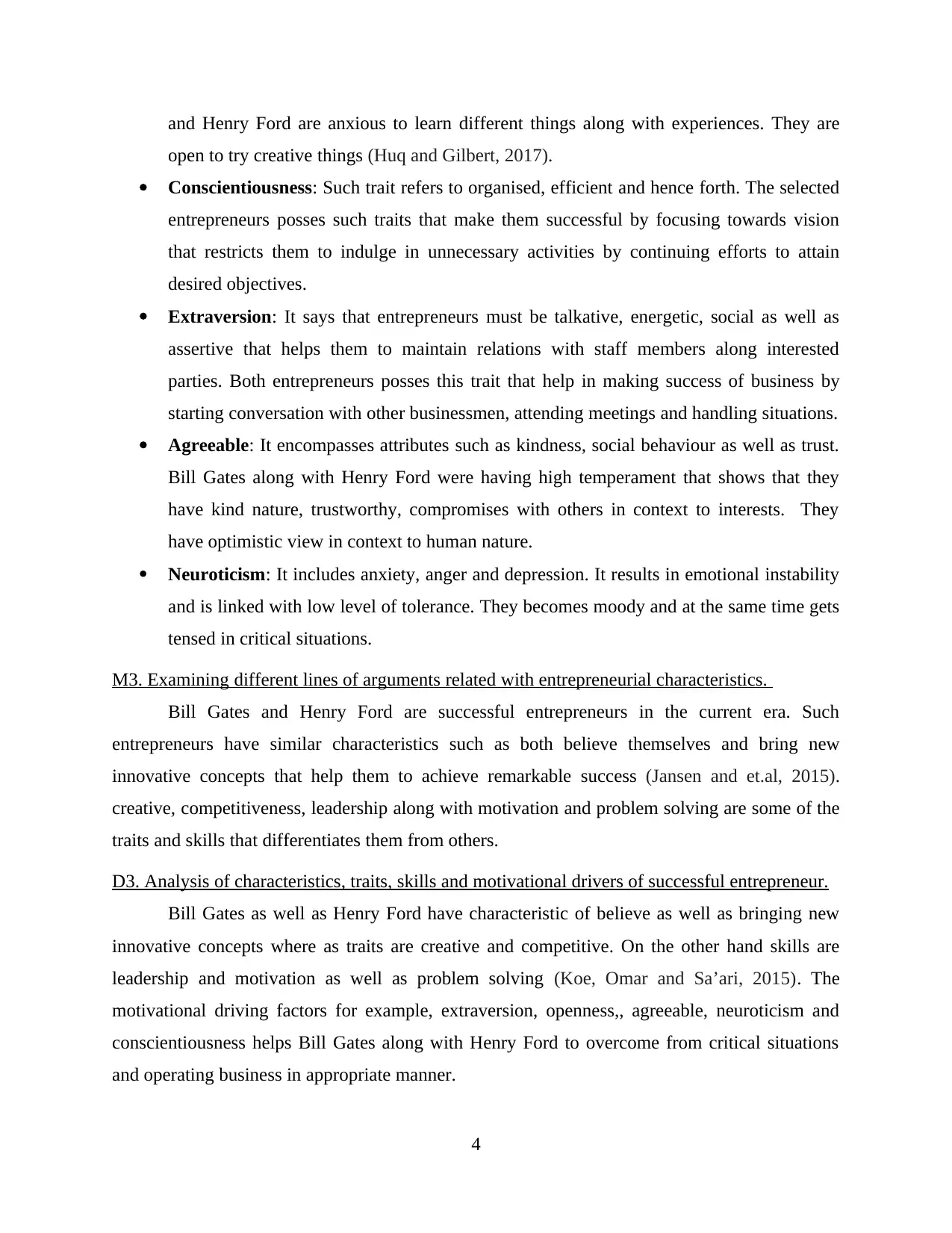
and Henry Ford are anxious to learn different things along with experiences. They are
open to try creative things (Huq and Gilbert, 2017).
Conscientiousness: Such trait refers to organised, efficient and hence forth. The selected
entrepreneurs posses such traits that make them successful by focusing towards vision
that restricts them to indulge in unnecessary activities by continuing efforts to attain
desired objectives.
Extraversion: It says that entrepreneurs must be talkative, energetic, social as well as
assertive that helps them to maintain relations with staff members along interested
parties. Both entrepreneurs posses this trait that help in making success of business by
starting conversation with other businessmen, attending meetings and handling situations.
Agreeable: It encompasses attributes such as kindness, social behaviour as well as trust.
Bill Gates along with Henry Ford were having high temperament that shows that they
have kind nature, trustworthy, compromises with others in context to interests. They
have optimistic view in context to human nature.
Neuroticism: It includes anxiety, anger and depression. It results in emotional instability
and is linked with low level of tolerance. They becomes moody and at the same time gets
tensed in critical situations.
M3. Examining different lines of arguments related with entrepreneurial characteristics.
Bill Gates and Henry Ford are successful entrepreneurs in the current era. Such
entrepreneurs have similar characteristics such as both believe themselves and bring new
innovative concepts that help them to achieve remarkable success (Jansen and et.al, 2015).
creative, competitiveness, leadership along with motivation and problem solving are some of the
traits and skills that differentiates them from others.
D3. Analysis of characteristics, traits, skills and motivational drivers of successful entrepreneur.
Bill Gates as well as Henry Ford have characteristic of believe as well as bringing new
innovative concepts where as traits are creative and competitive. On the other hand skills are
leadership and motivation as well as problem solving (Koe, Omar and Sa’ari, 2015). The
motivational driving factors for example, extraversion, openness,, agreeable, neuroticism and
conscientiousness helps Bill Gates along with Henry Ford to overcome from critical situations
and operating business in appropriate manner.
4
open to try creative things (Huq and Gilbert, 2017).
Conscientiousness: Such trait refers to organised, efficient and hence forth. The selected
entrepreneurs posses such traits that make them successful by focusing towards vision
that restricts them to indulge in unnecessary activities by continuing efforts to attain
desired objectives.
Extraversion: It says that entrepreneurs must be talkative, energetic, social as well as
assertive that helps them to maintain relations with staff members along interested
parties. Both entrepreneurs posses this trait that help in making success of business by
starting conversation with other businessmen, attending meetings and handling situations.
Agreeable: It encompasses attributes such as kindness, social behaviour as well as trust.
Bill Gates along with Henry Ford were having high temperament that shows that they
have kind nature, trustworthy, compromises with others in context to interests. They
have optimistic view in context to human nature.
Neuroticism: It includes anxiety, anger and depression. It results in emotional instability
and is linked with low level of tolerance. They becomes moody and at the same time gets
tensed in critical situations.
M3. Examining different lines of arguments related with entrepreneurial characteristics.
Bill Gates and Henry Ford are successful entrepreneurs in the current era. Such
entrepreneurs have similar characteristics such as both believe themselves and bring new
innovative concepts that help them to achieve remarkable success (Jansen and et.al, 2015).
creative, competitiveness, leadership along with motivation and problem solving are some of the
traits and skills that differentiates them from others.
D3. Analysis of characteristics, traits, skills and motivational drivers of successful entrepreneur.
Bill Gates as well as Henry Ford have characteristic of believe as well as bringing new
innovative concepts where as traits are creative and competitive. On the other hand skills are
leadership and motivation as well as problem solving (Koe, Omar and Sa’ari, 2015). The
motivational driving factors for example, extraversion, openness,, agreeable, neuroticism and
conscientiousness helps Bill Gates along with Henry Ford to overcome from critical situations
and operating business in appropriate manner.
4
⊘ This is a preview!⊘
Do you want full access?
Subscribe today to unlock all pages.

Trusted by 1+ million students worldwide
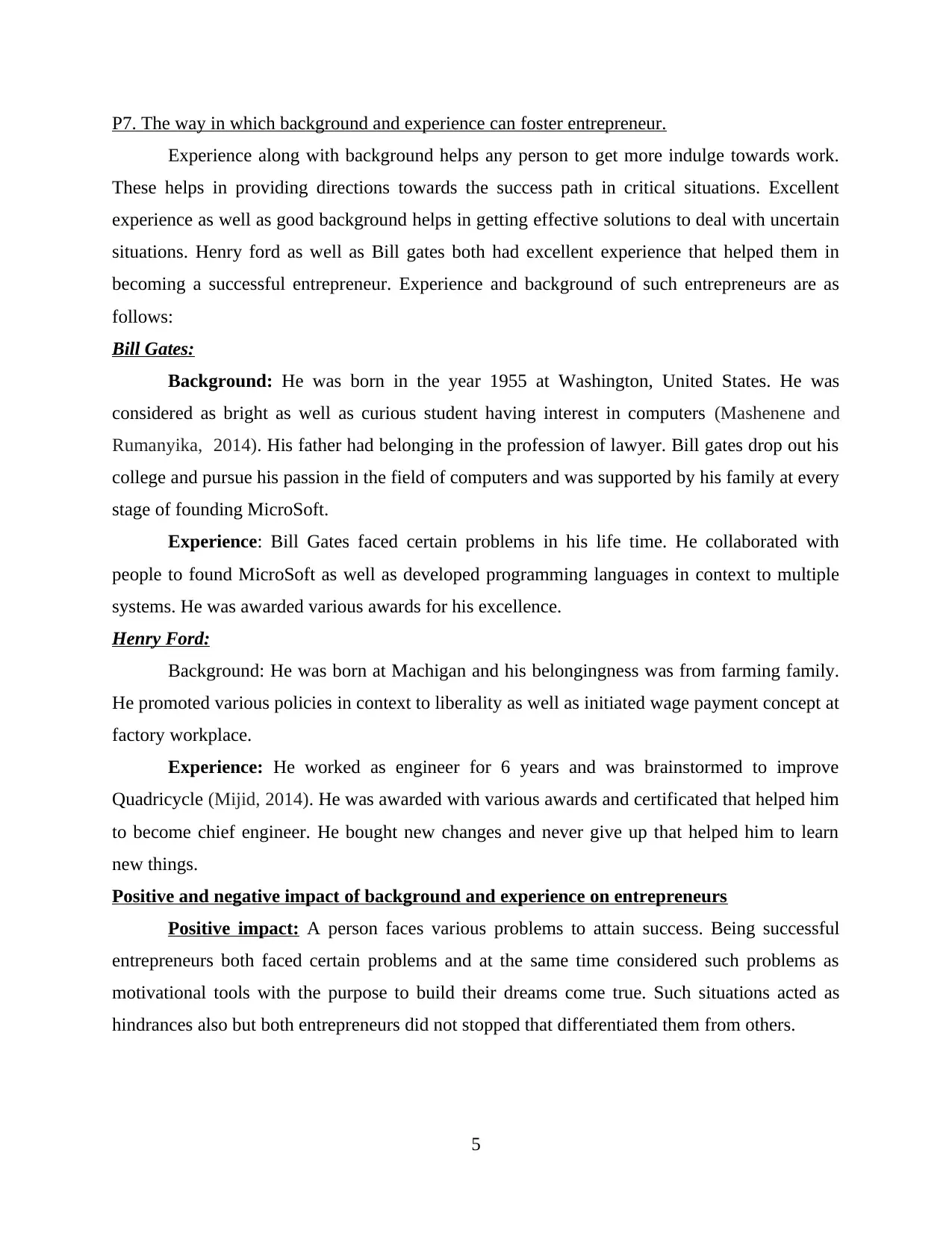
P7. The way in which background and experience can foster entrepreneur.
Experience along with background helps any person to get more indulge towards work.
These helps in providing directions towards the success path in critical situations. Excellent
experience as well as good background helps in getting effective solutions to deal with uncertain
situations. Henry ford as well as Bill gates both had excellent experience that helped them in
becoming a successful entrepreneur. Experience and background of such entrepreneurs are as
follows:
Bill Gates:
Background: He was born in the year 1955 at Washington, United States. He was
considered as bright as well as curious student having interest in computers (Mashenene and
Rumanyika, 2014). His father had belonging in the profession of lawyer. Bill gates drop out his
college and pursue his passion in the field of computers and was supported by his family at every
stage of founding MicroSoft.
Experience: Bill Gates faced certain problems in his life time. He collaborated with
people to found MicroSoft as well as developed programming languages in context to multiple
systems. He was awarded various awards for his excellence.
Henry Ford:
Background: He was born at Machigan and his belongingness was from farming family.
He promoted various policies in context to liberality as well as initiated wage payment concept at
factory workplace.
Experience: He worked as engineer for 6 years and was brainstormed to improve
Quadricycle (Mijid, 2014). He was awarded with various awards and certificated that helped him
to become chief engineer. He bought new changes and never give up that helped him to learn
new things.
Positive and negative impact of background and experience on entrepreneurs
Positive impact: A person faces various problems to attain success. Being successful
entrepreneurs both faced certain problems and at the same time considered such problems as
motivational tools with the purpose to build their dreams come true. Such situations acted as
hindrances also but both entrepreneurs did not stopped that differentiated them from others.
5
Experience along with background helps any person to get more indulge towards work.
These helps in providing directions towards the success path in critical situations. Excellent
experience as well as good background helps in getting effective solutions to deal with uncertain
situations. Henry ford as well as Bill gates both had excellent experience that helped them in
becoming a successful entrepreneur. Experience and background of such entrepreneurs are as
follows:
Bill Gates:
Background: He was born in the year 1955 at Washington, United States. He was
considered as bright as well as curious student having interest in computers (Mashenene and
Rumanyika, 2014). His father had belonging in the profession of lawyer. Bill gates drop out his
college and pursue his passion in the field of computers and was supported by his family at every
stage of founding MicroSoft.
Experience: Bill Gates faced certain problems in his life time. He collaborated with
people to found MicroSoft as well as developed programming languages in context to multiple
systems. He was awarded various awards for his excellence.
Henry Ford:
Background: He was born at Machigan and his belongingness was from farming family.
He promoted various policies in context to liberality as well as initiated wage payment concept at
factory workplace.
Experience: He worked as engineer for 6 years and was brainstormed to improve
Quadricycle (Mijid, 2014). He was awarded with various awards and certificated that helped him
to become chief engineer. He bought new changes and never give up that helped him to learn
new things.
Positive and negative impact of background and experience on entrepreneurs
Positive impact: A person faces various problems to attain success. Being successful
entrepreneurs both faced certain problems and at the same time considered such problems as
motivational tools with the purpose to build their dreams come true. Such situations acted as
hindrances also but both entrepreneurs did not stopped that differentiated them from others.
5
Paraphrase This Document
Need a fresh take? Get an instant paraphrase of this document with our AI Paraphraser
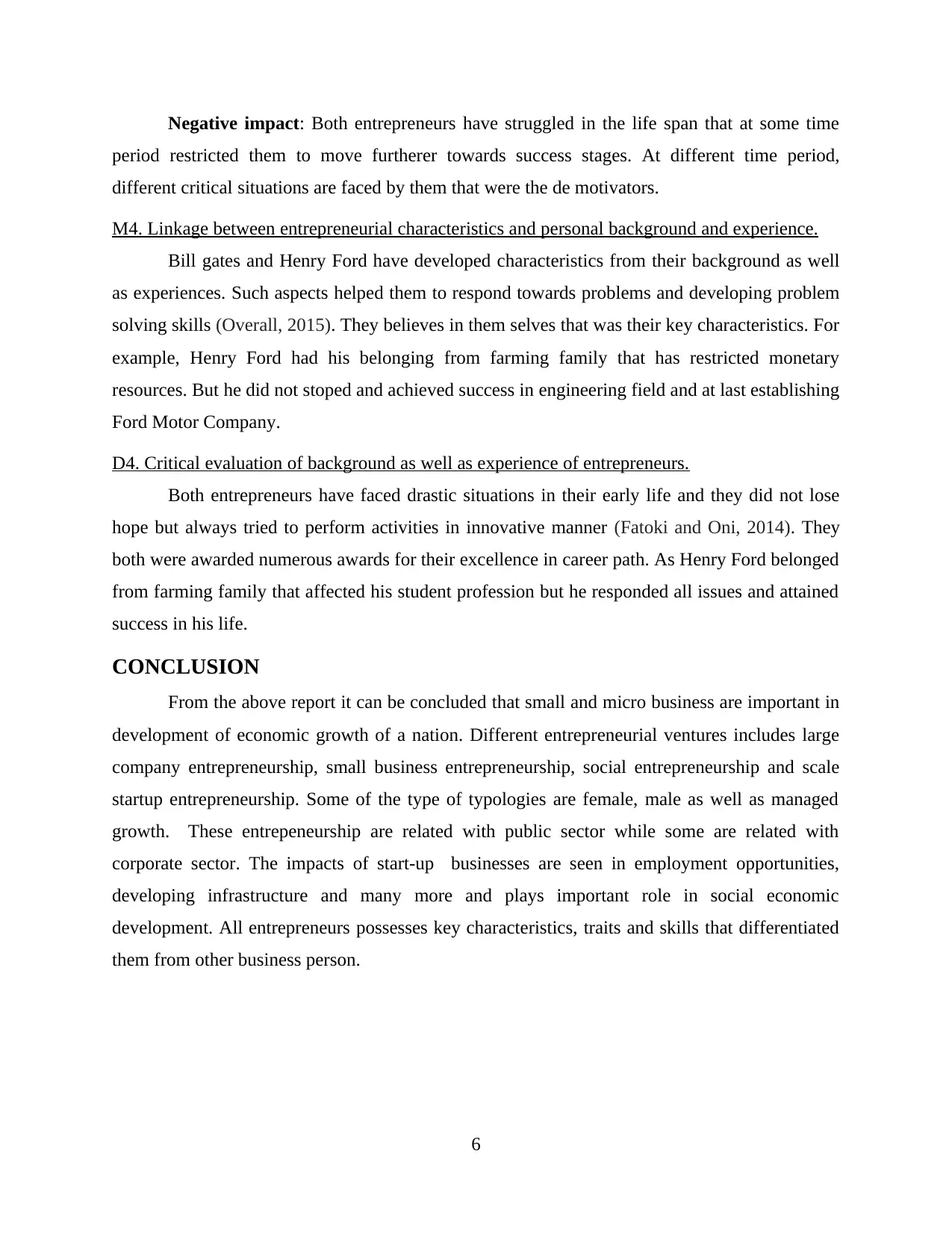
Negative impact: Both entrepreneurs have struggled in the life span that at some time
period restricted them to move furtherer towards success stages. At different time period,
different critical situations are faced by them that were the de motivators.
M4. Linkage between entrepreneurial characteristics and personal background and experience.
Bill gates and Henry Ford have developed characteristics from their background as well
as experiences. Such aspects helped them to respond towards problems and developing problem
solving skills (Overall, 2015). They believes in them selves that was their key characteristics. For
example, Henry Ford had his belonging from farming family that has restricted monetary
resources. But he did not stoped and achieved success in engineering field and at last establishing
Ford Motor Company.
D4. Critical evaluation of background as well as experience of entrepreneurs.
Both entrepreneurs have faced drastic situations in their early life and they did not lose
hope but always tried to perform activities in innovative manner (Fatoki and Oni, 2014). They
both were awarded numerous awards for their excellence in career path. As Henry Ford belonged
from farming family that affected his student profession but he responded all issues and attained
success in his life.
CONCLUSION
From the above report it can be concluded that small and micro business are important in
development of economic growth of a nation. Different entrepreneurial ventures includes large
company entrepreneurship, small business entrepreneurship, social entrepreneurship and scale
startup entrepreneurship. Some of the type of typologies are female, male as well as managed
growth. These entrepeneurship are related with public sector while some are related with
corporate sector. The impacts of start-up businesses are seen in employment opportunities,
developing infrastructure and many more and plays important role in social economic
development. All entrepreneurs possesses key characteristics, traits and skills that differentiated
them from other business person.
6
period restricted them to move furtherer towards success stages. At different time period,
different critical situations are faced by them that were the de motivators.
M4. Linkage between entrepreneurial characteristics and personal background and experience.
Bill gates and Henry Ford have developed characteristics from their background as well
as experiences. Such aspects helped them to respond towards problems and developing problem
solving skills (Overall, 2015). They believes in them selves that was their key characteristics. For
example, Henry Ford had his belonging from farming family that has restricted monetary
resources. But he did not stoped and achieved success in engineering field and at last establishing
Ford Motor Company.
D4. Critical evaluation of background as well as experience of entrepreneurs.
Both entrepreneurs have faced drastic situations in their early life and they did not lose
hope but always tried to perform activities in innovative manner (Fatoki and Oni, 2014). They
both were awarded numerous awards for their excellence in career path. As Henry Ford belonged
from farming family that affected his student profession but he responded all issues and attained
success in his life.
CONCLUSION
From the above report it can be concluded that small and micro business are important in
development of economic growth of a nation. Different entrepreneurial ventures includes large
company entrepreneurship, small business entrepreneurship, social entrepreneurship and scale
startup entrepreneurship. Some of the type of typologies are female, male as well as managed
growth. These entrepeneurship are related with public sector while some are related with
corporate sector. The impacts of start-up businesses are seen in employment opportunities,
developing infrastructure and many more and plays important role in social economic
development. All entrepreneurs possesses key characteristics, traits and skills that differentiated
them from other business person.
6
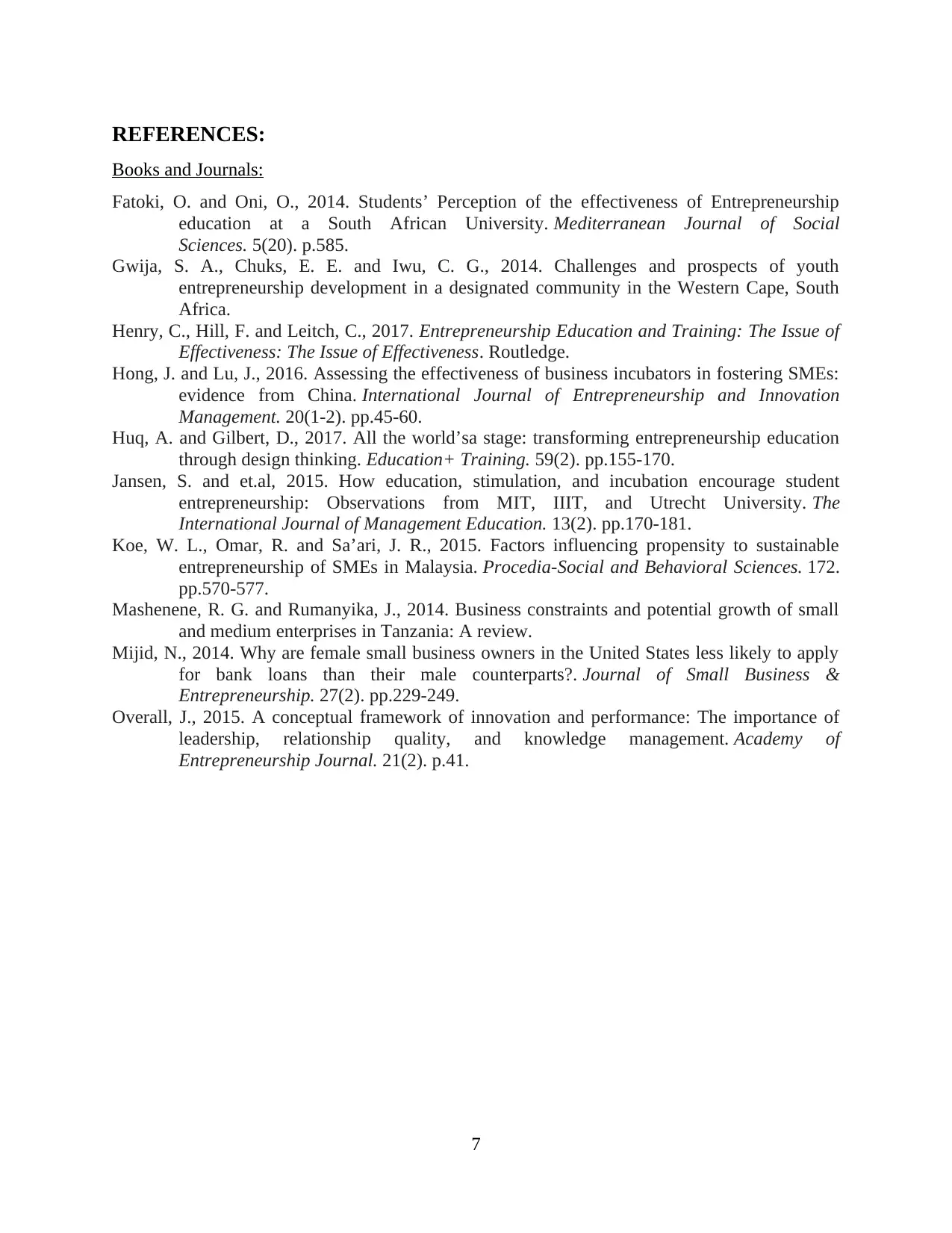
REFERENCES:
Books and Journals:
Fatoki, O. and Oni, O., 2014. Students’ Perception of the effectiveness of Entrepreneurship
education at a South African University. Mediterranean Journal of Social
Sciences. 5(20). p.585.
Gwija, S. A., Chuks, E. E. and Iwu, C. G., 2014. Challenges and prospects of youth
entrepreneurship development in a designated community in the Western Cape, South
Africa.
Henry, C., Hill, F. and Leitch, C., 2017. Entrepreneurship Education and Training: The Issue of
Effectiveness: The Issue of Effectiveness. Routledge.
Hong, J. and Lu, J., 2016. Assessing the effectiveness of business incubators in fostering SMEs:
evidence from China. International Journal of Entrepreneurship and Innovation
Management. 20(1-2). pp.45-60.
Huq, A. and Gilbert, D., 2017. All the world’sa stage: transforming entrepreneurship education
through design thinking. Education+ Training. 59(2). pp.155-170.
Jansen, S. and et.al, 2015. How education, stimulation, and incubation encourage student
entrepreneurship: Observations from MIT, IIIT, and Utrecht University. The
International Journal of Management Education. 13(2). pp.170-181.
Koe, W. L., Omar, R. and Sa’ari, J. R., 2015. Factors influencing propensity to sustainable
entrepreneurship of SMEs in Malaysia. Procedia-Social and Behavioral Sciences. 172.
pp.570-577.
Mashenene, R. G. and Rumanyika, J., 2014. Business constraints and potential growth of small
and medium enterprises in Tanzania: A review.
Mijid, N., 2014. Why are female small business owners in the United States less likely to apply
for bank loans than their male counterparts?. Journal of Small Business &
Entrepreneurship. 27(2). pp.229-249.
Overall, J., 2015. A conceptual framework of innovation and performance: The importance of
leadership, relationship quality, and knowledge management. Academy of
Entrepreneurship Journal. 21(2). p.41.
7
Books and Journals:
Fatoki, O. and Oni, O., 2014. Students’ Perception of the effectiveness of Entrepreneurship
education at a South African University. Mediterranean Journal of Social
Sciences. 5(20). p.585.
Gwija, S. A., Chuks, E. E. and Iwu, C. G., 2014. Challenges and prospects of youth
entrepreneurship development in a designated community in the Western Cape, South
Africa.
Henry, C., Hill, F. and Leitch, C., 2017. Entrepreneurship Education and Training: The Issue of
Effectiveness: The Issue of Effectiveness. Routledge.
Hong, J. and Lu, J., 2016. Assessing the effectiveness of business incubators in fostering SMEs:
evidence from China. International Journal of Entrepreneurship and Innovation
Management. 20(1-2). pp.45-60.
Huq, A. and Gilbert, D., 2017. All the world’sa stage: transforming entrepreneurship education
through design thinking. Education+ Training. 59(2). pp.155-170.
Jansen, S. and et.al, 2015. How education, stimulation, and incubation encourage student
entrepreneurship: Observations from MIT, IIIT, and Utrecht University. The
International Journal of Management Education. 13(2). pp.170-181.
Koe, W. L., Omar, R. and Sa’ari, J. R., 2015. Factors influencing propensity to sustainable
entrepreneurship of SMEs in Malaysia. Procedia-Social and Behavioral Sciences. 172.
pp.570-577.
Mashenene, R. G. and Rumanyika, J., 2014. Business constraints and potential growth of small
and medium enterprises in Tanzania: A review.
Mijid, N., 2014. Why are female small business owners in the United States less likely to apply
for bank loans than their male counterparts?. Journal of Small Business &
Entrepreneurship. 27(2). pp.229-249.
Overall, J., 2015. A conceptual framework of innovation and performance: The importance of
leadership, relationship quality, and knowledge management. Academy of
Entrepreneurship Journal. 21(2). p.41.
7
⊘ This is a preview!⊘
Do you want full access?
Subscribe today to unlock all pages.

Trusted by 1+ million students worldwide
1 out of 9
Related Documents
Your All-in-One AI-Powered Toolkit for Academic Success.
+13062052269
info@desklib.com
Available 24*7 on WhatsApp / Email
![[object Object]](/_next/static/media/star-bottom.7253800d.svg)
Unlock your academic potential
Copyright © 2020–2026 A2Z Services. All Rights Reserved. Developed and managed by ZUCOL.





